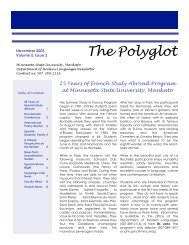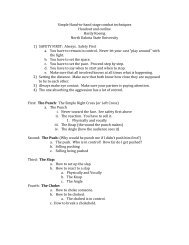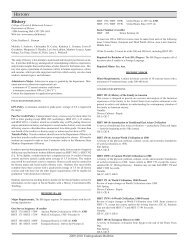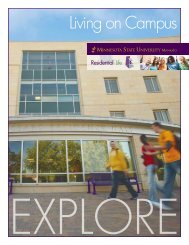Here - Minnesota State University, Mankato
Here - Minnesota State University, Mankato
Here - Minnesota State University, Mankato
You also want an ePaper? Increase the reach of your titles
YUMPU automatically turns print PDFs into web optimized ePapers that Google loves.
Preliminary Program - Draft Document<br />
Saturday, March 31<br />
Session 16<br />
A B C<br />
A Corpse Tail<br />
Storytelling in Word and Image:<br />
Teaching Native Graphic Novels<br />
Alienation<br />
11:00 - 12:15<br />
Byron F. Aspaas,<br />
Sasha Lapointe,<br />
Kateri Menominee,<br />
Veronica Jourdain,<br />
Collestipher Chatto,<br />
The Institute of American<br />
Indian Arts<br />
Panel Chair: Nancy J. Peterson,<br />
Purdue <strong>University</strong><br />
Static Pictures, Sequenced Images:<br />
The Flow of Time in Indigenous<br />
Comics<br />
Jeff Berglund,<br />
Northern Arizona <strong>University</strong><br />
Native Comics and Graphic<br />
Novels as Expressive Forms<br />
Kimberly Roppolo,<br />
<strong>University</strong> of Oklahoma<br />
Show and Tell: Visual Acuities and<br />
Narrative Possibilities in Native<br />
Graphic Texts<br />
Susan Bernardin,<br />
SUNY-Oneonta<br />
The Artisans of Terror: Violence,<br />
the Limits of Decolonization,<br />
and Restorative Justice in Leslie<br />
Marmon Silko’s Almanac of the<br />
Dead<br />
Thomas Krause,<br />
<strong>University</strong> of Oklahoma<br />
Belief in a Time of Trauma: Simon<br />
Ortiz’s Rosebud Reservation<br />
Winter<br />
Reginald Dyck,<br />
Capital <strong>University</strong><br />
American Indian Literary History<br />
& Human Rights Discourse:<br />
Diane Glancy’s Pushing the Bear<br />
Tereza M. Szeghi,<br />
<strong>University</strong> of Dayton<br />
“So Who is Listening Anyway?”:<br />
Issues of Audience and Teaching<br />
the Oral Tradition<br />
Barbara K. Robins,<br />
<strong>University</strong> of Nebraska at Omaha<br />
Sponsored by the ASAIL<br />
Pedagogy Committee<br />
12:30 - 1:30<br />
Session 17: Lunch<br />
A Conversation with Simon Ortiz<br />
Simon J. Ortiz writes poetry and prose that is at once honest and unfettered,<br />
and yet challenging. Using the simplest of language, Ortiz evokes the most<br />
complex feelings, and often a longing for the experiences about which he<br />
writes. In much of his work he maintains a simple tone that belies the<br />
adversity of his life. What Ortiz writes is important because he is teaching<br />
the art of experience, and doing it through language. Not suprisingly, he<br />
believes language is an important vehicle for finding and knowing who we<br />
are and professes a strong belief in the power of the oral traditions of his<br />
people. Although his words often seem innocent, the observations he makes<br />
could only come from one who has known the harshness of reality. That he<br />
manages such a firm belief in the power of experience and spirituality in the<br />
face of difficulty, is something well worth learning, a lesson that Ortiz, as<br />
well as Native Americans have to teach.<br />
Albuquerque, New Mexico 13
















